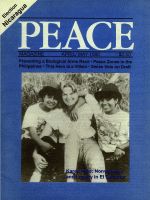
Peace Magazine Apr-May 1990, page 29. Some rights reserved.
Search for other articles by Edward Silva here
Peter A Brock, A Proxy for Knowledge: News Media as Agents in Arms Control and Verification Ottawa: Norman Paterson School of International Affairs 1989, 230pp.
THIS IS A book for those with a deep interest in how Canadian newspapers and television report peace issues. Its seventeen articles are the proceedings of the fourth annuat symposium on Arms Control and Disarmament Veri-fication held at Ottawa's Carleton University in 1987.
There are two main themes in the articles. One group of papers are by academics who analyze how the media cover peace and arms issues, and how events like the Vancouver Peace Walk and Cruise Missile Tests get reported.
Much of the explanation for the relatively superficial, inconsistent, and incomplete coverage involves how reporters put together stories; especially who their sources are and what their editors find newsworthy. The papers by Graham Knight, Peter Bruck, Robert Karl Manoff and Robert Hackett are brief and relatively lucid state-of-the-art academic accounts and will repay close reading with insight into how peace and arms news gets reported.
A second set of papers are from arms and policy professionals. Generally, these papers discourage any hopes we may have had that the media East or West might report peace and arms issues very independently from their govemment's perspective. However, generally Terry Liston's perspective of a well financed and well organized peace movement having great influence on the Canadian media will come as a very welcome surprise to all peace mongers holding this month's bake sales for next month's events.
I think this means that Canadian media coverage of peace and arms issues, while heavily influenced by U.S. officialdom, is yet somewhat open to peace activist input. Two papers on public opinion suggest why: Many Canadians are skeptical of both superpowers and urgently desire to end the cold war's waste of the world's human and material resources. So are many of the working press, and perhaps this is why they sometimes fail to follow official views.
In sum, then, this book for media specialists in the peace movement shows something of a paradox: how the media are largely state-influenced on peace and arms issues, yet some-what open to peace activist input. It also implies that we should continue to explore this paradox creatively by paying some attention to how reporters work and fitting our "press work" to their routines.
Edward Silva is a sociology professor at U. of Toronto.

Peace Magazine Apr-May 1990, page 29. Some rights reserved.
Search for other articles by Edward Silva here